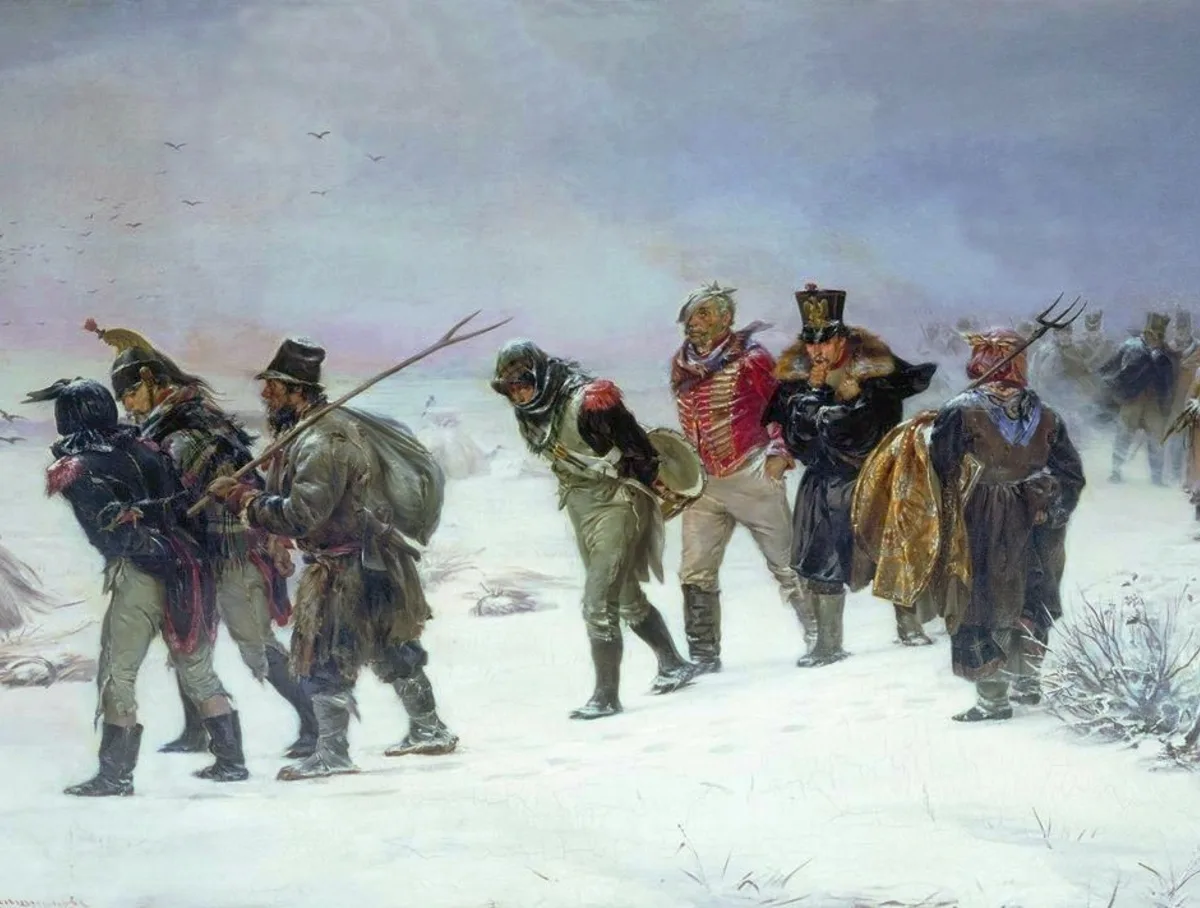You can often come across the statement that many familiar words and expressions in the Russian language have French roots - for example, the words “trash” and “shantrapa”. We decided to check the most common examples.
Shval
The legend about the French origin of the word “trash” can also be found in blogs, and in Media, which from time to time publish collections with such borrowings. Most often, this story is presented like this: in 1812, starving Frenchmen fleeing Russia begged the peasants for at least some food, not disdaining horse meat. In French, horse is cheval (the title of chevalier comes from this word), and they seemed to ask: “Cheval, cheval.” This is supposedly where the contemptuous “trash” came from. Confident about this wrote and former Minister of Culture, and now adviser to the President of the Russian Federation, Vladimir Medinsky in his book “About who and when composed myths about Russia.”
“He is, of course, inclined to regard our brother, that is, me and Rogozhin, as trash, and perhaps deservedly so.”
F. Dostoevsky, “The Idiot”
The French origin of the word is often confirmed by an example from memoirs poet Anton Delvig: “Smirnov, like many of the society of that time, spoke French poorly. He was a horse hunter and often used the word cheval, which he pronounced badly, so Tsurikov told him: “You yourself are trash!” But this is rather a pun, and the real history of the word is completely different.
In “Explanatory Dictionary of the Living Great Russian Language” by Vladimir Dahl is given not only the meaning of the word “trash” (riffraff, bastard or rabble, trashy little people), but also contains a reference to the origin of the verb “to sew”. In Vasmer's Etymological Dictionary, the most complete reference book on the origins of words, this question illuminated more details. Several versions of foreign origin are rejected by the author. There is both a French version (from cheval, literally “horse”, colloquial “bastard”, “rude”), and a German version (from Schwall, “swollen mass”), and even a version of the origin of the word from the name of a certain Novgorodian Ivashka Shval. The last example is worth taking a closer look at. Ivashka Shval is mentioned in the Novgorod III Chronicle, monument of the 17th century, known to us from lists of the 18th century. It contains story about the capture of Novgorod by the Swedes in 1611. And the main traitor turned out to be the aforementioned Ivashka Shval. The most convincing version in Vasmer's dictionary is considered to be the origin of the noun from the verb “to sew.” The word “trash” is formed according to the same model as, for example, “koval” (blacksmith) from “forge”, and originally meant the profession of a tailor. Obviously, someone in the family of the Novgorod traitor was a tailor - hence his surname, which was either his own nickname, or the nickname of one of his ancestors.
Thus, the word “trash” has nothing to do with the French “chevalier” or other derivatives of cheval.

Not true
Sharomyzhnik
The history of the word “sharomyzhnik”, meaning a swindler and deceiver, usually adjacent with a legend about expressions that came with the War of 1812. “When begging for something to eat, the French addressed the peasants as their best friends, namely, they said: “Cher ami,” which means “dear friend.” That’s how, constantly hearing “cher ami, cher ami, cher ami,” Russian peasants nicknamed the French beggars — “sharomyzhniki.” Vladimir also has this version Medinsky, and on the magazine’s website “Amateur"
“He was already on the stairs, when suddenly, right next to his nose, from nowhere, a policeman of amazing size appeared, and in his ears it sounded very unpleasantly: “Where are you, you little baller, going?”
M. Saltykov-Shchedrin, “Entangled Case”
The debate about the origin of the word “sharomyga” has been going on since the end of the 19th century. In the journal “Philological Notes” for 1889 there is article famous linguist Ivan Zheltov, in which he points to the French history of the word. According to him, “sharomyga” is “a product of the French phrase сher ami (dear friend), which took root on Russian soil at the end of the 18th century.” But for the same article there is also a note from the magazine editor Alexei Khovansky. He, in turn, believed that the expression was associated with the slang “ball”, that is, a gift. Compare with the modern expression “on the ball”. Subsequently, both options existed in parallel, and there is no consensus on this issue. In Vasmer's dictionary indicated, that both the French hypothesis is possible (as an option - from an address borrowed from the ragged retreating soldiers of Napoleon’s army in 1812), and the Slavic one (from “ball”).

This is not accurate
Shushera
All in the same collections On the French origin of Russian words, the word “riffraff” is also found, meaning a rabble, a worthless person or some kind of trash. This is another branch of the story about the retreating French: when they were asked where they were going, the French muttered: “Chez chérie,” that is, “to their beloved.” This is how the consonant word “riffraff” supposedly arose.
“Not some riffraff - artists, but students, and two-kopeck Senate officials, but people who needed a bottle of Medoc and some special beefsteak.”
T. Shevchenko, “Artist”
The word "riffraff" appears in texts before the French began to retreat. For example, in the same 1812 in one of propaganda posters Moscow mayor Fyodor Rostopchin states: “When you think that you are a spy, well, bring me to me, and don’t beat me and don’t criticize the Russians; The French troops should be buried, and not the eyes of the riffraff.” This is the ninth poster in a row, dated September 9, 1812. At this time, the French were in Moscow and had no plans to leave yet. The word comes across earlier - for example, in correspondence the future Decembrist Nikolai Turgenev for 1811. IN Vasmer's dictionary the French origin of the word is not even considered. The version of kinship with the Middle High German schar (“crowd”) is also decisively rejected. Researchers cite several dialect forms (“shusher”, “shushar”, “shushal” and “shushel”), but consider the origin of the word unclear. However, the French version is absolutely false.

Not true
Shantrapa
The word “chantrapa” (insignificant, worthless person, rogue) is often considered French in origin - this is also written about in blogs, and in Media. According to this version, “chantrap” comes from the French chantera pas (“will not sing”) and was used when selecting children for the landowner choir. Sometimes they also write that French tutors selected the children, which is why they pronounced the verdict in French.
“I didn’t count the times and I don’t want to count. But I see one thing - if you appear like this, it means you have no respect for the owner of the house. I say again: who are you? Beggar, shantrap, brown rags..."
M. Gorky, “The Bourgeois”
French version of the origin of the word given in Ushakov’s “Explanatory Dictionary”. However, there is no convincing evidence for this hypothesis. In Vasmer's dictionary indicated wide distribution of the word in Russian dialects, and the most probable version is put forward by the Czech Slavist Antonin Macenauer: he believed, that “shantrap” has a common Slavic origin. He cites the Old Czech equivalent of the word “deceiver” - šantrok (šаntroсh) - and traces it back to the Middle High German santrocke (“deception”). This version looks more convincing, given its prevalence in dialects, which could hardly have arisen as a result of private stories of selecting children for the choir.
Most likely not true
Sherochka with a masherochka
“Sherochka with Masherochka” is the name given to faithful, inseparable friends. And the expression, according to a common version, came from women's boarding schools, whose pupils addressed each other “ma chère” (“my dear”). The phrase arose because college girls danced with each other due to the absence of men in educational institutions. Many media write about this - from the educational site “Chalk» to entertaining Fishki.net.
“My sister danced beautifully, but she was always dissatisfied.
“You are a very clever gentleman, Alyosha,” she said, “but, you understand, you are still a brother, not a man.” With you, I’m like at the institute, a little girl with a little girl.”
A. Kuprin, “Junkers”
In Vasmer's dictionary the word "sherochka" noted as invariably accompanied by the words “with a little brush.” However, in some 19th century texts it can be meet and separately in the form of the usual address “dear”, ma chère or chérie. But the expression “sherochka with masherochka” really comes from the traditions of women’s boarding houses. Ma chère literally means "my dear". And in boarding schools, and, in particular, at the Smolny Institute, balls with the participation of invited gentlemen were rare. Lydia Charskaya, for example, writes about this in “Notes of an Institute Girl”: “They made a Christmas tree, organized a ball, where the institute girls danced not “sherochka and masherochka”, as was usually customary, but with real gentlemen, sent to such balls along with the corps and schools, and sometimes with brothers, cousins and just acquaintances invited by the students themselves.” In this case, the etymology is not questioned by any of the researchers.
Is it true
If you find a spelling or grammatical error, please let us know by highlighting the error text and clicking Ctrl+Enter.






